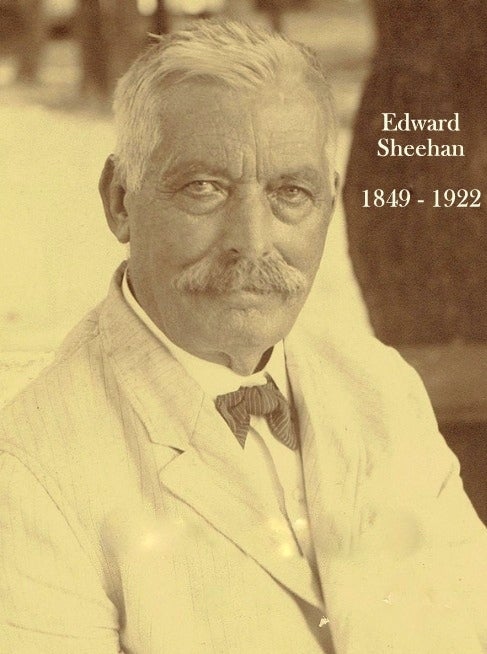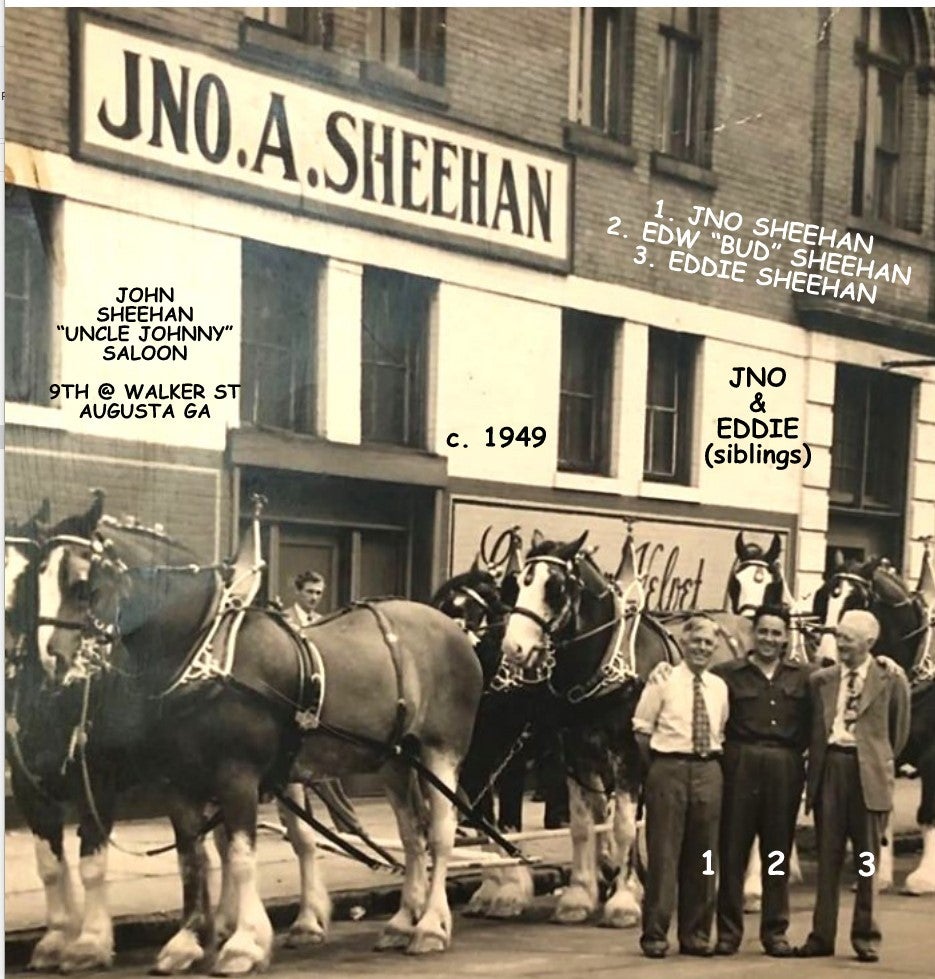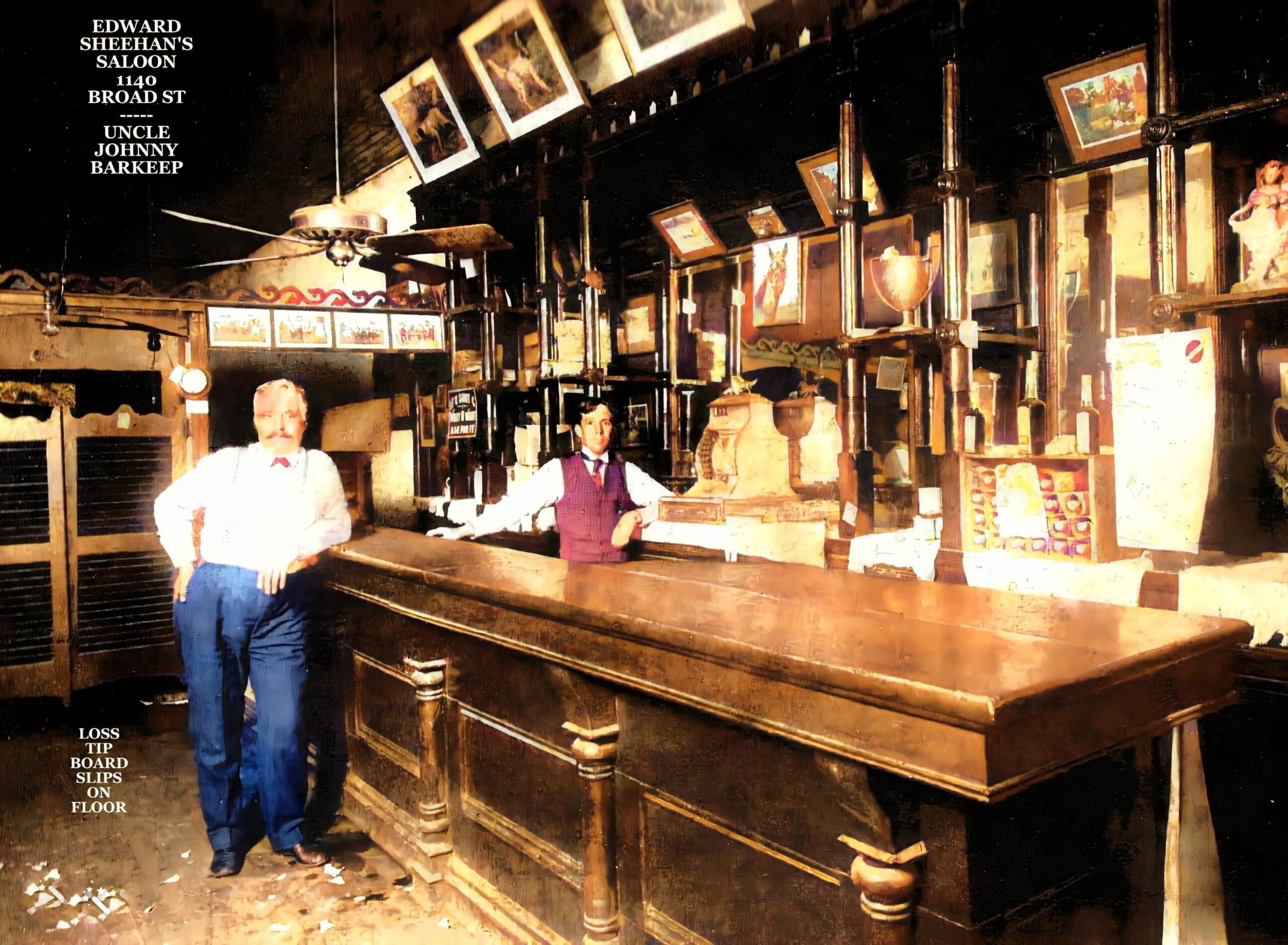Ed Sheehan was an Irish immigrant who went on to own a large soda and beer bottling factory and a popular saloon in downtown Augusta. Ironically, while he spent his days pouring whiskey in his smoke-filled establishment, Sheehan neither smoked tobacco nor drank alcohol.
According to an essay by Sheehan’s great-grandson Chris Edwards, Sheehan grew up on a wheat farm in Ireland, and when his parents had trouble making ends meet, they sent Sheehan and his three siblings to America with plans for the parents to join them when the funds were available.

Sheehan was just a lad of 15 in 1864 when he boarded one of the over-crowded, disease-laden ships that brough Irish immigrants to America to sail into an uncharted future. The ships were nicknamed “coffin ships” because so many passengers died on the Atlantic crossing.
After landing in New York, the Sheehans migrated to Savannah where Ed Sheehan found a job at a bottling factory washing the bottles by hand, according to Edwards.
Another of Sheehan’s great-grandsons, local historian Doug Herman, says that Sheehan struck up a friendship with owner of the Excelsior Bottling company John Ryan, and when Ryan retired, he left the factory in Sheehan’s hands.
Around that time, Sheehan would meet and fall in love with Annie Hickey, also an Irish immigrant, who lived in Augusta. After the couple married, they remained in Savannah for a short time until an outbreak of yellow fever caused them to make the decision to move the bottling plant to Augusta, according to Edwards.
MORE: Something You May Not Have Known: Butterfly McQueen had Augusta ties
The Sheehan Excelsior Bottling Works, which started out on Greene Street and later moved to Broad Street bottled mainly beer, but Sheehan also developed several flavors of soda including lemon and sarsaparilla, which he sold locally.
Sheehan opened up a saloon on Broad Street, which he ran along with his son John Augustan Sheehan.
At some point around 1899, according to Edwards, executives from the new Coca-Cola company approached Sheehan about becoming the regional bottler for the new soft drink, but Sheehan turned them down, thinking Coca-Cola nothing but a fad.
However, turning down Coke didn’t affect Sheehan’s fortunes. The family moved into a grand five-room mansion on Broad Street that was next door to the then-Mayor Walsh and his family.

“(Walsh) offered a small pecan tree to Edward as a housewarming gift. Edward declined the offer, explaining that the horses and wagons from his transfer company would surely trample over the small sprig if planted in his front yard,” Edwards wrote.
The two men decided to plant the tree along the fence line between the houses that sat on the land where Curtis Baptist Church stands today. The pecan tree remained in the parking lot of the church long after the houses were gone but was finally cut down to make way for the church’s latest expansion.
The bottling factory declined after a glass shortage during World War I, but the saloon remained popular, and the whiskey continued to flow even during Prohibition.
According to Herman, the saloon wasn’t a speakeasy, as local officials simply allowed it to operate in the open. However, the Feds, aware that Augusta was one of the “wettest” cities in the nation, took interest.
MORE: Something You Might Not Have Known: The Augusta Canal
Ed Sheehan was arrested along with his son John, but Ed was released due to his advanced age.
John Sheehan would be arrested a further six times and spent time in jail. Well sort of. Both Herman and Edwards say the “cell” was furnished, carpeted and had curtains. The door to the cell was never locked.
The younger Sheehan would later move the bar to Greene Street near Union Station and was popular among soldiers coming home from World War II and stationed at Camp Gordon.
There still is a Sheehan’s Irish Pub located on Central Avenue, and Herman says the current Sheehan’s is not owned by the family but is definitely a nod to Ed Sheehan and his legacy.
…And that is something you may not have known.
Scott Hudson is the senior reporter for The Augusta Press. Reach him at scott@theaugustapress.com











